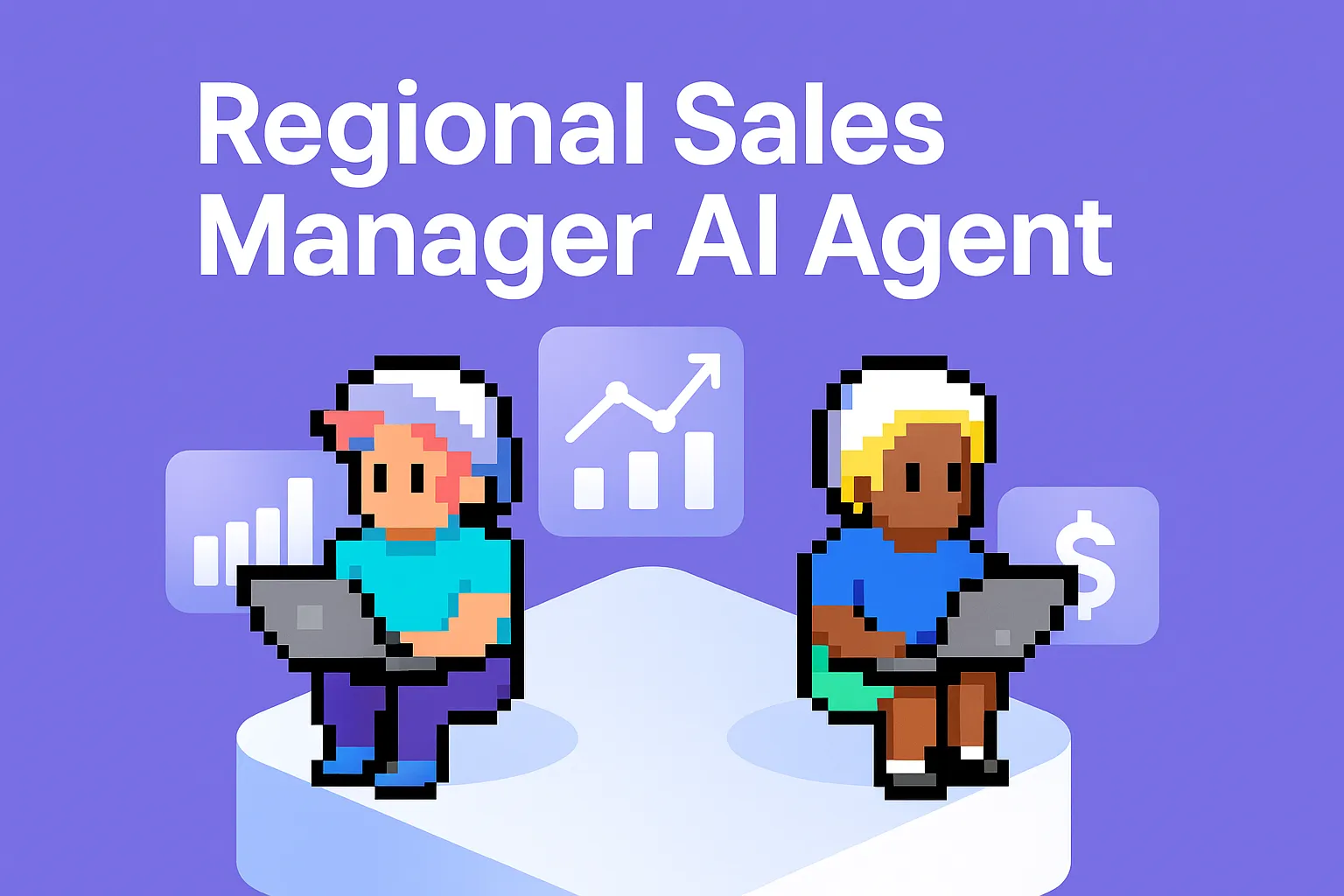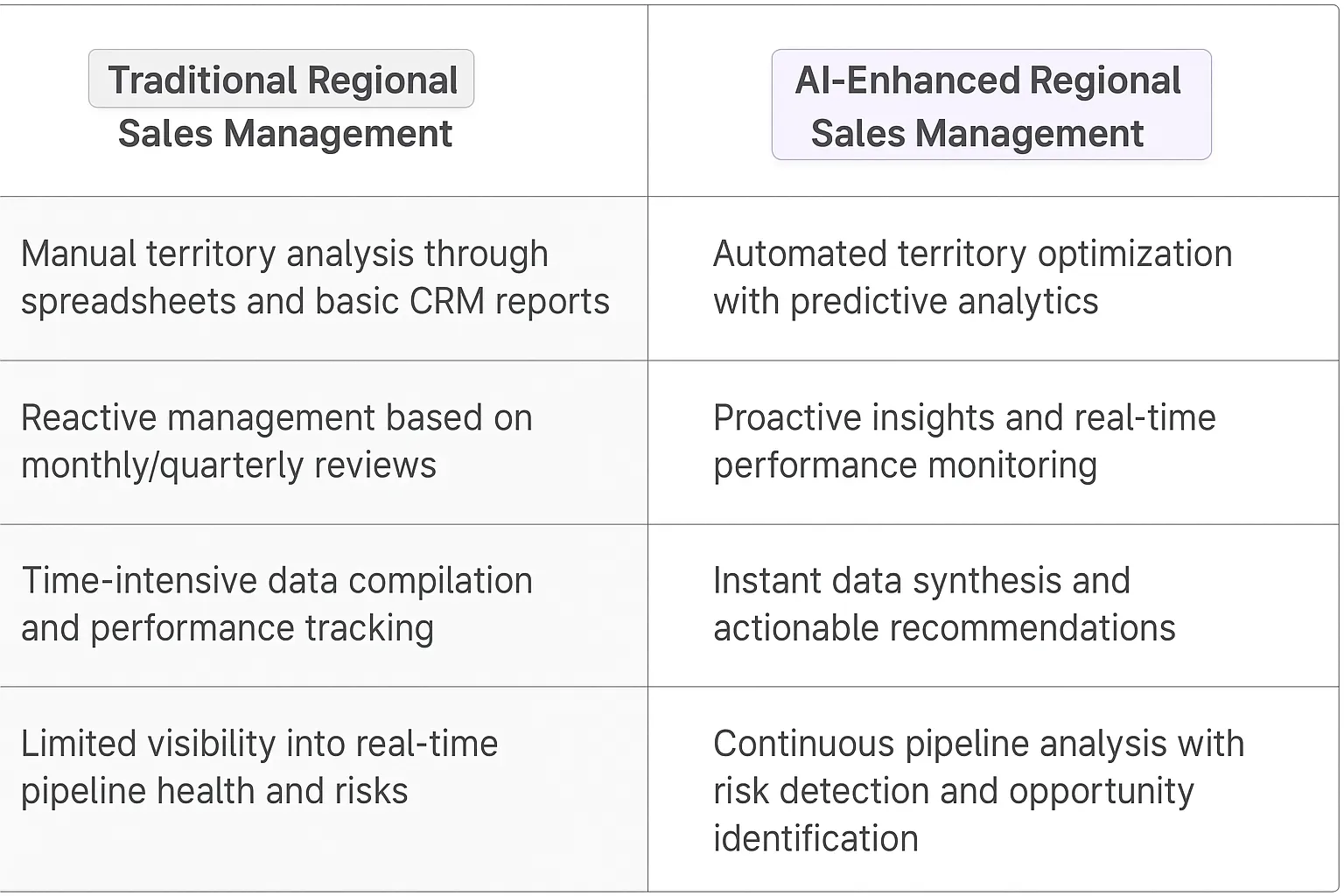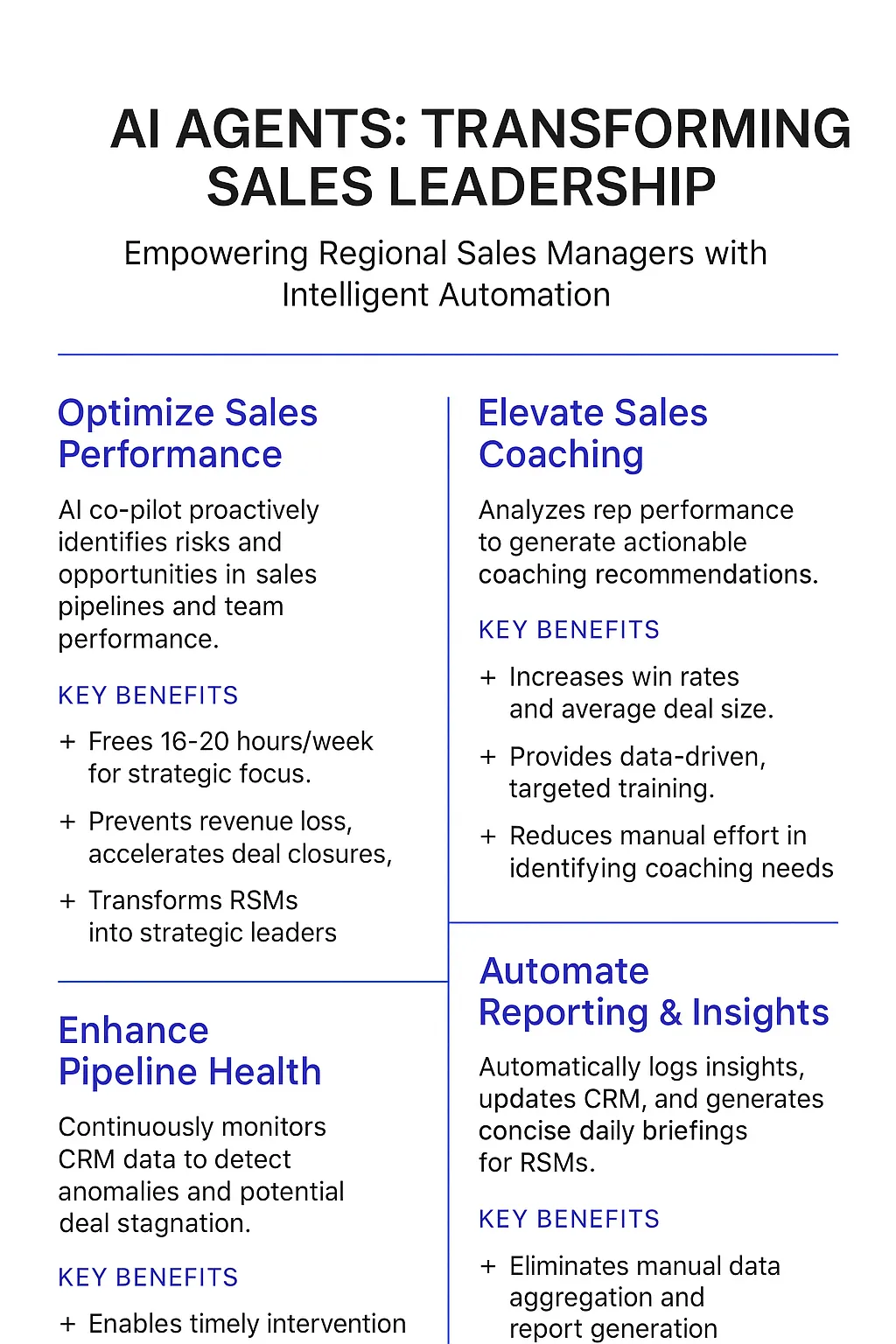A Regional Sales Manager AI Agent is a sophisticated digital teammate that processes vast amounts of sales data to drive territory performance and team effectiveness. Unlike basic automation tools, these AI agents actively learn from historical patterns, current market conditions, and team behaviors to provide strategic insights and actionable recommendations. They operate continuously across multiple territories, analyzing everything from deal pipelines to rep performance metrics.

Regional sales managers traditionally juggled multiple tools and manual processes to keep their teams running. They'd spend hours in spreadsheets tracking performance metrics, writing individual coaching notes, and trying to standardize best practices across different territories. The real pain point? They'd often miss crucial insights buried in their CRM data, leading to missed opportunities and inconsistent team performance.
The old playbook involved constant context switching between email, CRM systems, reporting tools, and team communication platforms. Sales managers would manually compile weekly reports, dig through conversation logs, and piece together territory insights through time-consuming 1:1s with their reps.
Digital teammates fundamentally transform how regional sales managers operate. They act as a force multiplier, handling the heavy lifting of data analysis and surfacing actionable insights that directly impact revenue.
The most compelling benefit is the shift from reactive to proactive management. AI agents continuously monitor deal pipelines, identifying risk factors before they become problems. They'll flag when a key account's engagement drops or when a territory shows unusual patterns - the kind of subtle signals humans often miss.
For coaching and development, AI agents analyze successful sales conversations and automatically extract winning patterns. This means sales managers can replicate top performer strategies across their entire team. Instead of relying on gut feel, managers now have data-backed recommendations for each rep's development areas.
Territory optimization becomes significantly more sophisticated. AI agents process vast amounts of historical data to suggest optimal account distributions, identify underserved markets, and predict which territories have the highest growth potential. This level of analysis would take weeks to do manually - if it was possible at all.
The real game-changer is how AI agents handle the mundane but critical tasks of sales operations. They automatically update CRM records, generate territory reports, and maintain sales forecasts with unprecedented accuracy. This frees up managers to focus on what matters most: strategic planning and meaningful coaching conversations with their teams.

Regional sales management has traditionally been a high-touch, relationship-driven role that's heavily dependent on human judgment and experience. But we're seeing a fascinating shift where AI agents are amplifying - not replacing - these core competencies.
The most effective regional sales managers I've observed are using AI agents as force multipliers. They're deploying them to handle the quantitative heavy lifting - the pipeline analysis, territory mapping, and performance tracking that previously consumed 40-50% of their time. This creates space for more strategic activities like coaching, relationship building, and complex deal navigation.
What's particularly interesting is how this creates a compounding effect. As the AI agent processes more regional data, it builds an increasingly sophisticated understanding of territory dynamics, buying patterns, and team performance trends. This knowledge base becomes a powerful strategic asset that grows more valuable over time.
The key insight here is that AI agents aren't just tools for efficiency - they're becoming essential partners in strategic decision-making. They're enabling a new model of regional sales management that's more data-driven, proactive, and scalable while preserving the human elements that drive sales success.

The versatility of AI agents for Regional Sales Managers creates tangible value across multiple sectors. Regional Sales Managers face unique challenges in each industry - from managing distributed teams in manufacturing to coordinating multi-state retail operations. Let's dive into specific examples where AI agents transform how Regional Sales Managers operate and drive results.
What's particularly fascinating is how these digital teammates adapt to industry-specific contexts. In pharmaceuticals, they help RSMs navigate complex compliance requirements while tracking sales performance. For technology companies, they excel at analyzing competitive intelligence and market penetration data across different territories. The key insight is that AI agents aren't just tools - they're becoming integral parts of regional sales leadership, providing the kind of nuanced support that traditionally required multiple human analysts.
The most compelling aspect is how AI agents are shifting from basic task automation to becoming strategic partners in territory management and team development. They're particularly effective at identifying patterns in sales data across regions, spotting opportunities that humans might miss, and providing actionable intelligence that Regional Sales Managers can use to make better decisions.
The automotive retail industry faces unique challenges managing multiple dealership locations across different markets. A Regional Sales Manager AI Agent transforms how automotive groups handle their multi-location operations by analyzing complex data patterns that humans often miss.
At a major automotive group in the Southwest, their digital teammate monitors real-time inventory levels, pricing dynamics, and sales performance across 12 dealerships. The AI agent identifies when certain models are underselling in one location but moving quickly in another, then automatically suggests inventory reallocation to maximize total group revenue.
Beyond inventory optimization, the AI agent tracks individual sales team performance metrics and local market conditions. When it notices the Tucson location's SUV sales dropping despite strong regional demand, it analyzes customer feedback, competitor pricing, and sales team behaviors to pinpoint the root cause - in this case, identifying that the sales team needed additional training on new hybrid SUV features.
The most compelling aspect is how the AI agent handles the complexity of regional pricing strategy. It continuously monitors competitor pricing across all markets, factors in local demand patterns, and recommends location-specific pricing adjustments that maintain profitability while staying competitive. This dynamic pricing capability helped the automotive group increase their profit margins by 14% while maintaining market share.
What makes this particularly powerful is the AI agent's ability to learn from historical data while adapting to real-time market changes. When a competitor runs unexpected promotions, the agent quickly detects the impact on sales velocity and suggests targeted counter-measures for affected locations.
This level of granular, data-driven management across multiple locations simply wasn't possible before. The AI agent effectively becomes an always-on regional manager that can process vast amounts of data, spot patterns, and make recommendations that drive measurable business results.
Running regional restaurant operations is notoriously complex - I've seen countless restaurant groups struggle with inconsistent performance across locations. The introduction of Regional Sales Manager AI Agents is fundamentally changing this dynamic in ways that remind me of how AWS transformed infrastructure management.
A restaurant group I work with in New England deployed an AI agent to oversee operations across their 15 locations. The agent analyzes hourly sales data, labor costs, food waste metrics, and customer satisfaction scores - surfacing insights that would take a human regional manager weeks to uncover.
The most fascinating aspect is how the AI agent handles demand forecasting and staff scheduling. By processing historical data, weather patterns, local events, and real-time booking information, it predicts staffing needs with remarkable accuracy. When a major concert was announced near their Providence location, the agent automatically adjusted staffing recommendations three weeks in advance.
Menu optimization is another area where the AI agent shines. It tracks item-level profitability across locations, considering regional ingredient costs and local preferences. When it noticed that the seafood pasta was underperforming in inland locations but thriving in coastal restaurants, it recommended menu variations that boosted overall group profitability by 18%.
The real game-changer is the agent's ability to identify and replicate success patterns. When the Burlington location consistently outperformed others in wine sales, the AI analyzed their service patterns, staff training, and customer interactions. It then created location-specific training modules to replicate these winning behaviors across other restaurants.
This shift to AI-powered regional management represents a step-function improvement in multi-location restaurant operations. The traditional model of regional managers trying to juggle multiple locations through periodic visits and weekly reports simply can't match the depth and immediacy of AI-driven insights.
Building an effective Regional Sales Manager AI agent requires sophisticated data integration across multiple systems. The agent needs to process real-time sales data, CRM information, and regional market trends simultaneously. One major hurdle is ensuring the agent can handle different data formats from legacy sales tools - many organizations still use a mix of modern and traditional systems that don't play nicely together.
The agent must also maintain consistent performance across different regional databases and time zones. We've seen cases where data lag between regions created conflicting recommendations, especially in organizations spanning multiple countries. Getting the data architecture right is mission-critical.
Sales teams often develop their own workflows and processes over time. Introducing an AI agent into these established patterns requires careful change management. The agent needs to complement existing sales methodologies without disrupting proven techniques that work well.
Training the agent on regional nuances presents another significant challenge. Sales approaches that work in the Northeast US may fail in Southeast Asia. The agent must recognize these cultural and market differences while maintaining consistent core sales principles.
Sales managers may initially resist sharing decision-making authority with an AI agent. Building trust takes time and requires demonstrating clear value through small wins. Start with low-stakes decisions like meeting scheduling and pipeline analysis before expanding to strategic territory planning and quota setting.
The agent also needs to develop appropriate escalation paths when it encounters edge cases. Not every sales situation fits neatly into predefined parameters. Having clear protocols for when human judgment should take precedence prevents costly missteps.
Sales data often contains sensitive customer information and revenue details. The agent must maintain strict data handling protocols while still delivering actionable insights. This becomes especially complex when dealing with regions that have different privacy regulations like GDPR in Europe versus CCPA in California.
Regular security audits and access controls need to be baked into the agent's architecture from day one. One breach could devastate customer trust and tank sales performance across regions.
Regional Sales Manager AI Agents represent a fundamental evolution in how sales organizations operate. The technology isn't just about automation - it's about amplifying human capabilities and enabling a new model of data-driven sales leadership. The most successful implementations happen when organizations view these AI agents as strategic partners rather than just tools. As the technology continues to mature, we'll likely see even more sophisticated applications that further transform regional sales management.
The key to success lies in thoughtful implementation, clear change management, and a focus on using AI to enhance rather than replace human judgment. Organizations that get this balance right are seeing significant improvements in sales performance, team development, and territory optimization. The future of regional sales management is increasingly collaborative between human leaders and their AI counterparts.